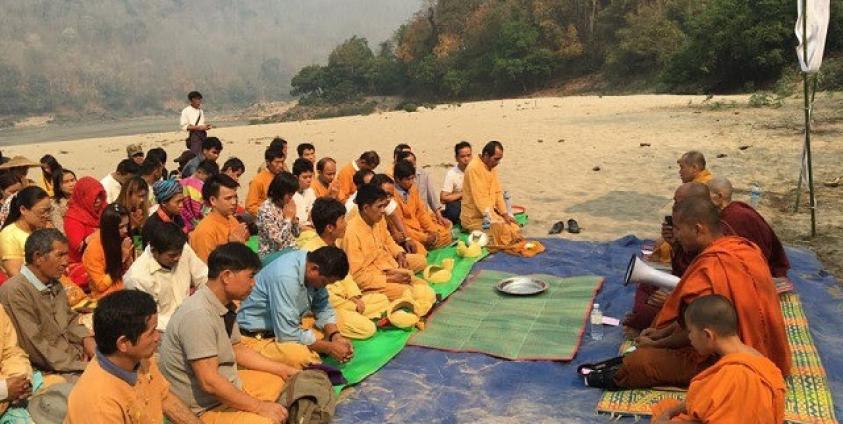Members of the Save the Salween Network gathered at Wan Sala village in Shan state’s Mong Ton township on 14 March to mark International Rivers Day and voice their opposition to a series of six dams set to be built on the SalweenRiver, also known as the Thanlwin River. Of particular concern to the group of environmentalists and concerned citizens is the Mong Ton dam project, which if constructed in Shan State is expected to be South East Asia’s largest dam.
The 241 meter high dam will flood an area of more than 640 sq kms, including hundreds of villages, farms and ecologically sensitive forest areas.
A statement released by the Save the Salween Network said: “We deplore the Burmese government’s attempts to push ahead with mega dams in ethnic conflict zones, against the wishes of local ethnic communities. This shows bad faith towards the peace process, and will destroy the trust of ethnic stakeholders and exacerbate conflict.”
The statement continued: “The mighty Salween River must be left in its natural free flowing state, supporting the rich biodiversity of ecosystems along its entire length, which provide food security for ethnic communities throughout the river basin. The incalculable environmental and social costs of damming the river far outweigh any of the supposed economic benefits.”

The Mong Ton Dam project is backed by a consortium of firms led by the China Three Gorges Corporation, a Chinese government owned firm who run the largest dam in the world on the Yangtze River. The other foreign firms involved in the project are Sinohydro, China Southern Power Grid and a subsidiary of the Electricity Generating Authority of Thailand (EGAT). The local partners are the Burmese Ministry of Electric Power and the International Group of Entrepreneurs (IGE), a firm controlled by the offspring of the late Aung Thaung, the long-time industry minister for General Than Shwe’s military regime.
An Australian firm, SMEC, has been hired to conduct environmental and social impacts assessment studies for the Mong Tong dam project. SMEC’s attempts to hold consultations last year with affected communities in Shan state garnered a lot of criticism from activists including a group called Action for Shan State Rivers, who alleged that SMEC was carrying out the studies in a manner that was not consistent with international standards.
Action for Shan State Rivers also alleges that SMEC did not do enough to inform villagers about the potentially huge impact the dam would have on their livelihoods and the local environment. The activists claim that SMEC chose to hold information sessions that were designed to give villagers a favourable impression of the dam project, something that conflicts with the firm’s role of studying the dam’s downstream impacts
By Shan Herald Agency for News (SHAN)







